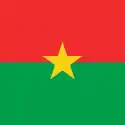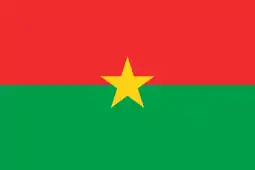Republic of Upper Volta
Republic of Upper Volta République de Haute-Volta (French) | |||||||||
|---|---|---|---|---|---|---|---|---|---|
| 1958–1984 | |||||||||
 Flag
| |||||||||
Motto: "Unité – Travail – Justice" (in French) "Unity – Work – Justice" | |||||||||
Anthem: "Hymne National Voltaïque" | |||||||||
 | |||||||||
| Capital | Ouagadougou | ||||||||
| Common languages | French | ||||||||
| Government | One-party presidential republic (1960–1966) Military dictatorship (1966–1984) | ||||||||
| President | |||||||||
• 1959–1966 | Maurice Yaméogo | ||||||||
• 1966–1980 | Sangoulé Lamizana | ||||||||
• 1980–1982 | Saye Zerbo | ||||||||
• 1982–1983 | Jean-Baptiste Ouédraogo | ||||||||
• 1983–1984 | Thomas Sankara | ||||||||
| High Commissioner | |||||||||
• 1958–1959 | Max Berthet | ||||||||
• 1959–1960 | Paul Masson | ||||||||
| Prime Minister | |||||||||
• 1971–1974 | Gérard Kango Ouédraogo | ||||||||
• 1983 | Thomas Sankara | ||||||||
| Historical era | Cold War | ||||||||
| December 11, 1958 | |||||||||
| August 5, 1960 | |||||||||
| January 3, 1966 | |||||||||
| November 25, 1980 | |||||||||
| November 7, 1982 | |||||||||
| August 3, 1983 | |||||||||
• Renamed | August 4, 1984 | ||||||||
| Currency | CFA franc | ||||||||
| |||||||||
| Today part of | |||||||||
Part of a series on the |
||||||||||||||
|---|---|---|---|---|---|---|---|---|---|---|---|---|---|---|
| History of Burkina Faso | ||||||||||||||
 | ||||||||||||||
|
||||||||||||||
|
||||||||||||||
The Republic of Upper Volta (French: République de Haute-Volta), now Burkina Faso, was a landlocked West African country established on December 11, 1958 as a self-governing colony within the French Community.[1][2] Before attaining autonomy it had been French Upper Volta and part of the French Union. On August 5, 1960, it attained full independence from France.[3] On August 4, 1984, it changed its name to Burkina Faso.
Name and flag

The name Upper Volta indicated that the country contains the upper part of the Volta River. The colors of the national flag corresponded to the names of its three main tributaries — the Black Volta, the White Volta, and the Red Volta.[4]
History
Upper Volta obtained independence on August 5, 1960. The first president of the country, Maurice Yaméogo, is at the head of the Alliance for Democracy and the Federation / African Democratic Rally. The 1960 Constitution establishes the election by direct universal suffrage of the President and the National Assembly for a term of five years. Shortly after coming to power, Yaméogo banned all political parties other than the Alliance for Democracy.
Thomas Sankara came to power through a military coup d'état on August 4, 1983.[5] After the coup, he formed the National Council for the Revolution (CNR), with himself as president. Under the direction of Sankara, the country changed its name on August 4, 1984, from Upper Volta to Burkina Faso, which means "Land of Incorruptible People".[6]
Policy
From 1958 to 1960, the Republic of Upper Volta was led by a High Commissioner:
- Max Berthet (December 11, 1958 to February 1959),
- Paul Masson (February 1959 to August 5, 1960).
From 1971 to 1987, the Republic of Upper Volta was led by a Prime Minister:
- Gérard Kango Ouedraogo (February 13, 1971, to February 8, 1974)
- Thomas Sankara (August 4, 1983, to October 14, 1987)
Symbols
Flag
The three colors of the national flag of Upper Volta come from the fact that the Volta has three parts: the Black Volta, the White Volta, and the Red Volta.
National Hymn
|
In French: Fière Volta de mes aieux, Nous te ferons et plus forte, et plus belle Le travail de ton sol brûlant Que Dieu te garde en sa bonté, |
In English: Proud Volta of my ancestors, We will make you stronger and more beautiful The work of your burning ground May God keep you in his goodness, |
This anthem has been replaced since 1984 by a new anthem, the Ditanyè.
See also
- History of Burkina Faso
- List of governors of Upper Volta
- List of heads of state of Burkina Faso
- List of heads of government of Burkina Faso
References
- "Burkina Faso". Afripedia. Africa.com. Archived from the original on 2017-02-11. Retrieved 2017-02-09.CS1 maint: unfit URL (link)
- "Field Listing: National Holiday". The World Factbook. CIA. Archived from the original on 2020-09-22. Retrieved 2020-11-30.
- Meredith, Martin (2013). The State of Africa. Simon & Schuster. p. 69. ISBN 9780857203885.
- "Upper Volta (Burkina Faso, 1959-1984)". Flags of the World. Archived from the original on 2020-09-20. Retrieved 2020-11-30.
- "Thomas Sankara". Encyclopedia Britannica. Archived from the original on 2016-10-10. Retrieved 2017-02-09.
- "More (Language of the Mossi Tribe) Phrase Book". World Digital Library. Archived from the original on 23 November 2018. Retrieved 16 February 2013.


